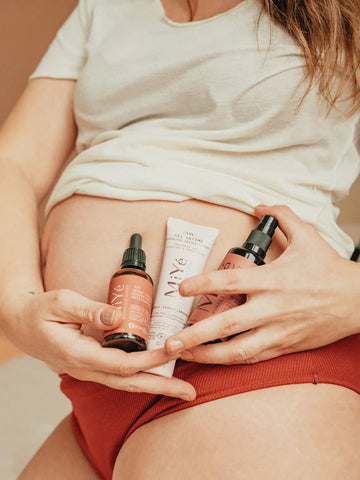How to take care of yourself during postpartum?

What is postpartum?
Post-pregnancy , often overlooked in the conversation about motherhood , is a very important and intense phase in a woman's life. It is an event which generally follows the first 6 weeks after childbirth , until the return of confinement, that is to say the first periods after pregnancy . From this point on, the body undergoes significant physical and emotional changes. Thus, in certain cases there may be difficulties, even complications, which may arise due to the profound changes affecting all of a woman's bearings, especially when it is her first child . This is why it requires careful monitoring and special attention to live this adventure more peacefully.
Physical changes
Recovery of the body
After giving birth, a woman's body requires time to recover. Internal organs return to their normal positions, muscles repair themselves and post-delivery fatigue can be significant. In addition, the rest of the pregnancy is not only marked by physical adjustments but also by the gradual resumption of the menstrual cycle . Lochia , often overlooked, represents bleeding following childbirth. This discharge, a mixture of blood, mucous membranes and uterine tissue, can last up to six weeks.
New mothers may be surprised by the appearance of these discharges but it is important to understand that it is a natural part of the healing process.
In addition to lochia , the return of menstruation can be a significant milestone for women during the post-baby phase.
Hormonal fluctuations
Hormonal fluctuations during the postnatal period are inevitable and play a significant role in the body's adaptation to the new reality of motherhood. Levels of hormones, such as estrogen and progesterone, which were at peaks during pregnancy, decrease significantly after childbirth. This hormonal drop can trigger symptoms such as fatigue, mood swings, postpartum depression syndrome or even irritability. However, the impact is not only emotional, it is also physical since some women can experience significant hair loss, breast tension , changing skin, etc.
These hormonal changes are not just limited to sex hormones. The hormone prolactin, responsible for milk production, also experiences a significant increase. These hormonal adjustments can influence mood regulation, stress management and even sleep quality in a new mother.
To better understand how these hormonal fluctuations can vary from woman to woman and their impact on overall well-being, there are hormonal diagnostics that are a valuable resource for women in their postpartum caregiving period.
It is essential to recognize that these hormonal changes are an integral part of the postnatal recovery process.
Emotional changes
The importance of emotional well-being
The period after childbirth is also an emotionally intense phase. New moms may face mood swings, feelings of mental fatigue, and concerns about parenting. It is essential for these women to recognize and express their emotions. The social pressure surrounding motherhood can sometimes lead to the repression of feelings but it is essential to understand that feeling a range of emotions is perfectly natural! During postnatal care, many women may experience deep discomfort related to not feeling ready to take on the role of mother.
Support and connection
Social support is a cornerstone of postnatal emotional well-being. Surrounding new mothers with understanding, listening and love is essential.
The support of family, friends and partner is invaluable. During this time of change, just knowing that you are surrounded by love and understanding can make all the difference. Whether it's offering a shoulder to lean on or simply listening, support from those around you helps ease the emotional burden often felt after childbirth. This phase can sometimes create challenges in the relationship with the partner. Sleepless nights, increased responsibilities, and adjustments to new parenting roles can test emotional connection. It's essential to express feelings openly, share responsibilities, and find special moments of connection, even if they're simple.
If it is difficult for you to be able to confide in yourself about your doubts, your fears or your anxieties, you can look for local or online support groups. Connecting with people who are going through the same time can provide comfort and valuable advice. If you feel the need to speak to someone or ask specific questions about postpartum, the “Allo Parents Bébé” toll-free number for help and support for parenting, 0800 00 3456 (free service and call) aims to provide advice, emotional support or simply to share your experience with caring professionals.
Self-care and confidence
Taking care of yourself during postpartum is essential. Recovery from pregnancy is more than a physical transition, it is also an emotional journey where self-care plays a vital role.
Engaging in self-care after birth is not a luxury but a necessity. Taking a few moments each day to relax, recharge, and connect with yourself can do wonders for mental and emotional well-being. Using good products in the phase of your life after baby will allow your body to relieve and help it during this period.
Confidence, too, can be shaken during postpartum recovery, between physical changes, sleepless nights and adjustments to life with a newborn. However, confidence is an intrinsic quality that every woman possesses. Doing activities that make you feel good, wearing clothes and menstrual underwear that make you feel beautiful is a step toward self-care, a move that builds inner confidence, because every woman deserves to feel powerful every time. stage of her maternal journey.
Conclusion
Postpartum is a delicate transition period that requires special attention.
It emerges as a crucial stage in the journey of motherhood, requiring particular sensitivity. The physical and emotional changes that accompany it make this period a unique and sometimes complex experience for every woman, especially when she discovers motherhood for the first time.
Through these weeks after giving birth, we encourage new mothers to focus on themselves, embrace their emotional balance and find confidence and beauty in each stage of their transformation.
So, to help all these women during this event Perdième and Miyé, two brands known in the world of women's well-being, have together created a postpartum box . This carefully designed box has been specially developed to support women in their recovery period after childbirth and treat, for example, hair loss, lochia, tight and irritated skin and intimate imbalances. Inside this kit, high quality products as well as essential elements for comfort and recovery have been meticulously chosen to offer optimal support. A perfect alliance between two brands dedicated to female pleasure.
For more inspiration and advice, follow Miyé on Instagram for moments of everyday maternal comfort.
To extend reading:
- Postpartum bleeding
- What is the link between menstrual cycle and mood?
- Body positive or summerbody
- Emotions during menstruation
Sources:
- Hello parents baby .
- By The Manual's Editorial Staff (2022, August). Overview of the postpartum period . MSD Manuals for the general public.





